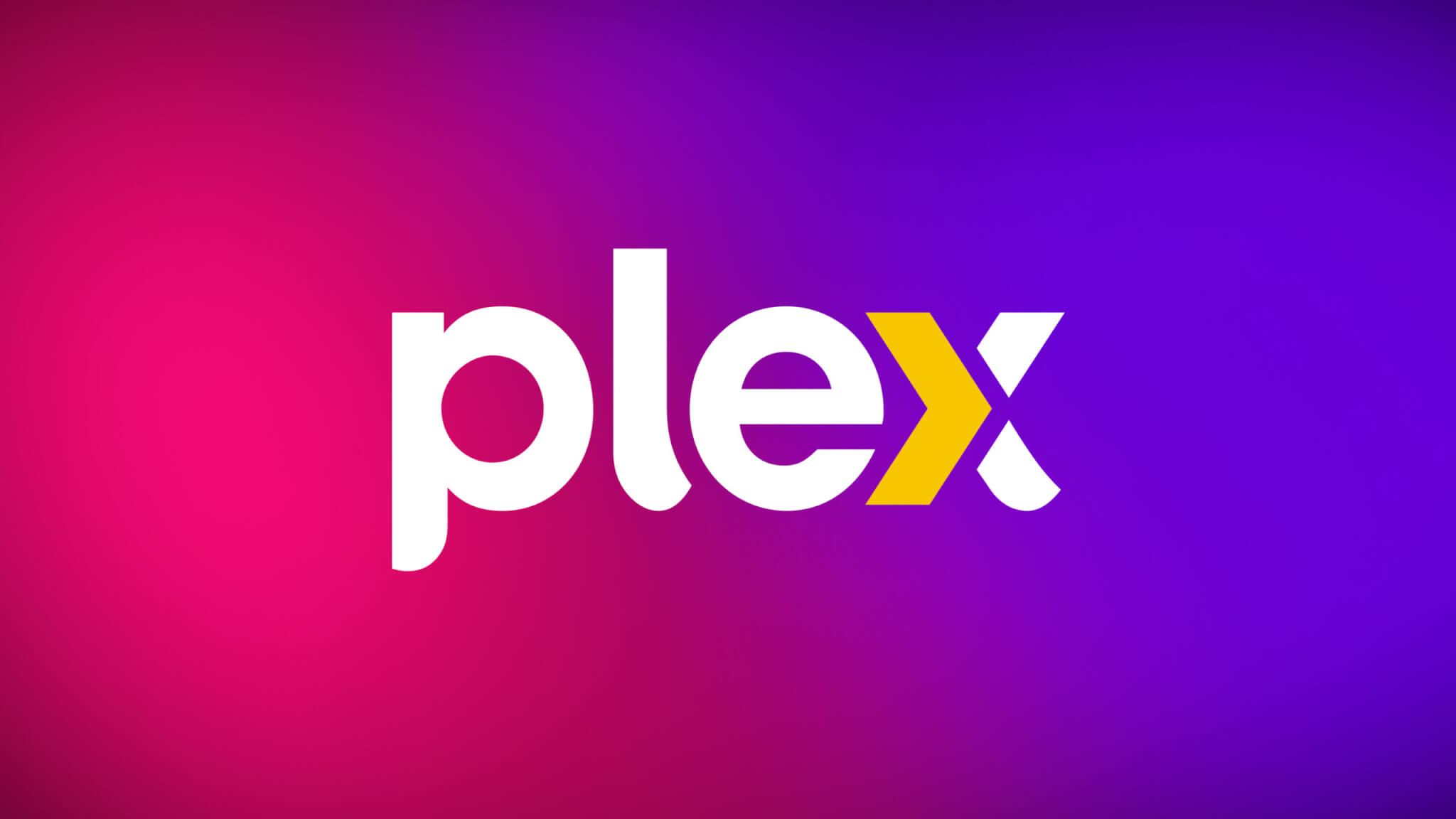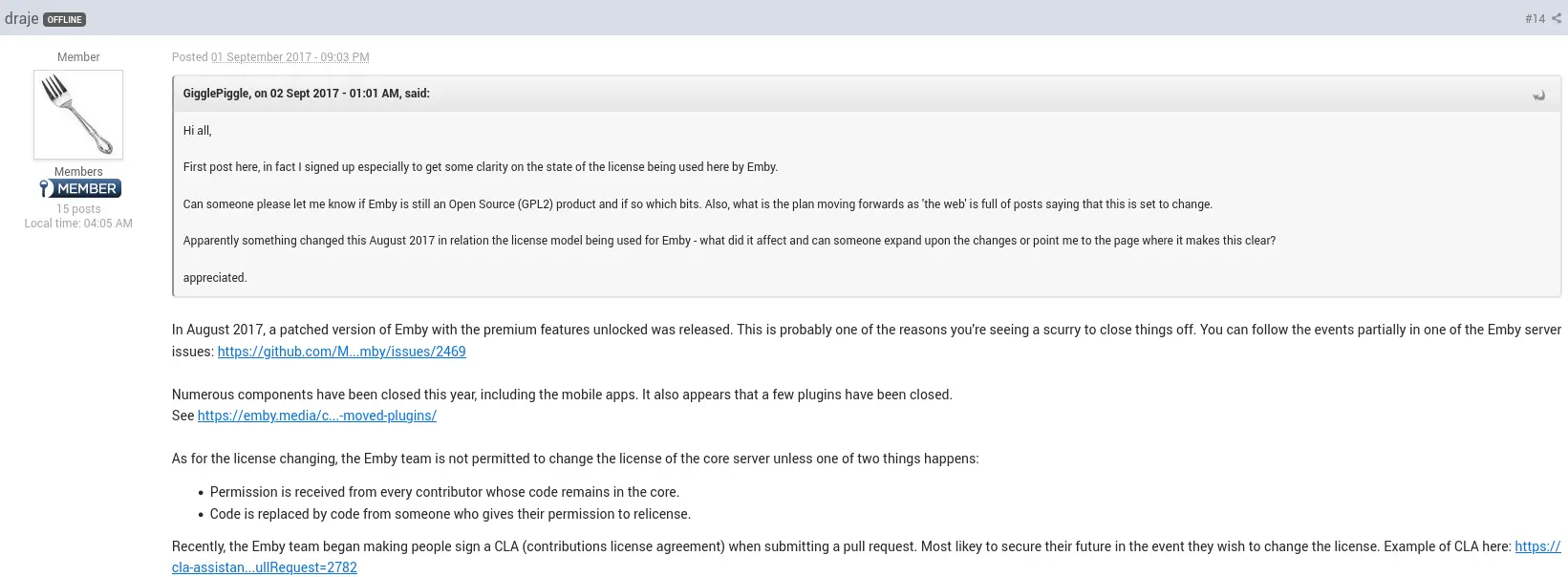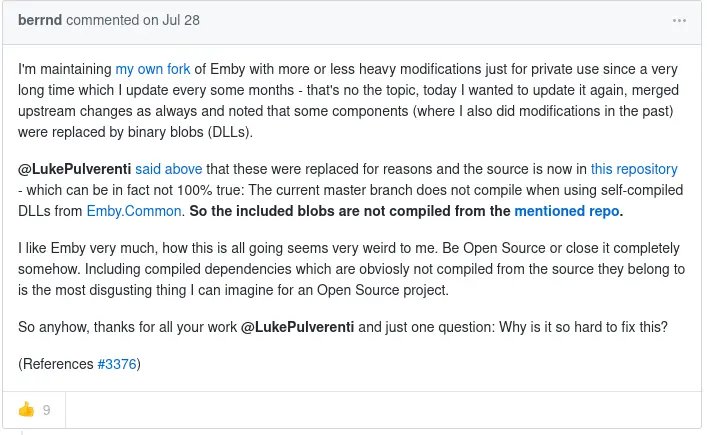We are also changing how remote playback works for streaming personal media (that is, playback when not on the same local network as the server). The reality is that we need more resources to continue putting forth the best personal media experience, and as a result, we will no longer offer remote playback as a free feature. This—alongside the new Plex Pass pricing—will help provide those resources. This change will apply to the future release of our new Plex experience for mobile and other platforms.
As a result I imagine more users will look at other offerings such as Jellyfin.
https://github.com/jellyfin/jellyfin
https://jellyfin.org/FUCK Emby! What they did was worse than what Plex is doing even now
Another user said that was because users were modifying the code to avoid supporting the project? I got a lifetime subscription relatively inexpensive and haven’t had trouble
Who said that? I did a search in the thread and no Ody said anything about that that I saw
So the issue is kind of similar to bitwarden; how to protect the premium bits when having an open source core?
They just didn’t handle it as gracefully.
https://www.theregister.com/2024/11/04/bitwarden_gpls_password_manager/Here’s the history regarding emby if you’re curious:
https://github.com/nvllsvm/emby-unlocked
What did they do?
Basically, slammed the source code door shut after making promissory statements like “Don’t worry, we’ll always be open source” for years. With little/no notice they relicensed everything and pivoted to a closed source paywall model.
No discussion with the community or contributors, no alternatives explored, no polls or surveys. Just woke up one day to a “Sorry, but we’re going closed source because moneyyyy” blog post
Jellyfin was born right after, forked out of vengeance.
In retrospect we should have seen it coming when they would do odd little things, like keeping the build scripts closed source n crap, but eh hindsight and all that lol
They too put a whole lot behind their subscription though
https://emby.media/support/articles/Premiere-Feature-Matrix.htmlI bought a lifetime sub, now I don’t have to pay anything
This might be what it takes to at least get me to install it.
Do they live well together with the same shared media library?
Also, are there audiobook clients for Jellyfin?
Of you use docker plex and jellyfin arent gonna be messing with your media unless you delete/modify them within the respective clients (but then again thats what *arr is for)
I found audiobooks to be kind of awkward on jellyfin. I’m now running Audiobookshelf for all my audiobooks, radio shows and podcasts. Together with the Lissen app on Android, it works very nicely!
And what about just plain music? Is Jellyfin or Audiobookshelf better suited for that?
For music, I selfhost navidrome. Works nicely with the Tempo app on android, or Feishin on desktop.
I also recommend audio bookshelf but am using ShelfPlayer on iOS
I’ve had Jellyfin and Plex running using the same media directory for a couple years now. I think I had to make a couple small changes for things like seasons of a TV show to show up correctly, but nothing incredibly difficult. Definitely worth setting up and playing with periodically so when you do finally get sick of Plex, you’re ready to just switch.
Only thing I use Plex for exclusively now is when I’m flying, Plex has the Netflix style download option and Jellyfin just downloads the video file. I like Plex’s way better just from personal preference.
I didn’t enjoy using Jellyfin for audiobooks, on my android I use the Jellyfin client to download the book I wanna listen to and then I use AudioAnchor for listening to it.
I’ve heard rumors that they do play well together, but that’s people running it in docker with a “read-only” flag set for the content folder, with metadata saved in the config folder
I’ve used the Jellyfin app to listen to audio books, but for my purposes, it’s easier to run the separate client/server Audiobookshelf.
Makes sense. I’m fully dockerized so I’ve got that going for me
I’m fully Dockerized (well, uhh… Podmanized) and I’m dual-wielding Plex and Jellyfin. Runs smoothly and both only have read to the content. All management of the media is handled by the *arr stack anyway. I even set up a volume for Plex to throw conversions into that Jellyfin can’t see. I’m currently personally using Jellyfin and I’m waiting for Jellyfin to be good enough (or Plex bad enough…) for the users I share with to switch over.
I can definitely recommend that setup.
I’ve had Plex and Emby (what Jellyfin was forked from) running alongside one a other for years now on Windows with zero issues. They shouldn’t have any effect on one another.
My Jellyfin and Plex containers were able to use the same locations for media.
I installed Plex before learning I’d have to pay for any of the functionality I was looking for. Installed Jellyfin and used the Plex folders lol
I haven’t used Plex myself but Jellyfin doesn’t create any kind of meta files in the library folders. If that is true for Plex as well then I don’t see why it would be a problem to point them at the same shared library.
My experience is that both Plex and Jellyfin pointed at the same media files causes no issues.
Plex stores its metadata in a special folder, and I’ve got the *arr stack managing the actual media files, so I think I can run them in parallel.
Looks like I’ve got a project for the weekend! Jebediah’s just gonna have to wait to go to Jool.
I thought that was already true
I used to use Plex, then one day my internet was down and since Plex couldn’t phone home, it wouldn’t let me log in to watch media ON MY LAN.
So yeah it’s inherently broken. That’s before you even consider the licensing.
Any Kodi users here?
Subscriptions are a non-starter for me
I’ve paid for the lifetime subscription for Plex…Still only using Jellyfin
I can justify a one time purchase, but never recurring payments.
And that’s why open source is best.
deleted by creator
I feel like it’s just a matter of time, until they pull the rug from under lifetime subs.
But in any case, this is probably it for me. I’m not completely happy with jellyfin performance on my server, but the price hike puts me outside of what i’m willing to spend for this service. I already host it myself, and i can tunnel it myself too, if i ever decide to run it outside of my home network
Huh, I was somewhat excited about the elimination of the playback limit for mobile apps (we are in 2025 ffs!) and then re-read that this will be only applicable for the subpar preview version once it is released… Which doesn’t fucking has the watch together feature lmao.
The only good news in a nutshell is that I am still a Plex Pass Lifetime User, so in a nutshell I don’t get good news lol.
I keep a Jellyfin instance running as a hedge. Here’s the thing with Plex (and actually a lot of companies set up similarly): those “lifetime” memberships are a trap. Think about it: Plex gets your money ONCE but they have ongoing expenses. Sooner or later, they’ll have spent every single cent made by a lifetime membership unless they either get more folks OR squeeze everyone a bit more.
Once they started adding their own shows and making strange UI decisions, I could sense the end was coming. A move like this brings it up fast. Jellyfin is not nearly as good as Plex in a lot of ways, but it’s really Open Source.
Anyway, a lot of rambling, but in short: when there is a “lifetime” subscription, watch out!
So glad i switched to jellyfin half a year ago
Same. My wife also just asked me to get a bunch of audio books too…so looks like I have to set up that now
https://arstechnica.com/gadgets/2025/03/i-threw-away-audibles-app-and-now-i-self-host-my-audiobooks/
Check out this arstechnica article on AudioBookshelf. Should cover most of what you need to get started.
The default Jellyfin client isn’t great for audiobooks.
For Apple iOS you might wanna look at https://github.com/LeoKlaus/plappa
For Android I would look at https://github.com/advplyr/audiobookshelf
Personally I just download the audiobooks from Jellyfin and play it in https://f-droid.org/packages/com.prangesoftwaresolutions.audioanchor/I run audiobookshelf and it’s amazing!
Thank you
I would recommend audiobookshelf for the audiobooks, especially if you have your stuff running in docker. It seemed to me like the solutions to force Plex or jellyfin to do books were a bit more hacky than I wanted.
Dude, I’m blown away by how easy AudioBookShelf was to set up. I was going to go with Jellyfin for audiobooks too since I already had my libraries set up, but I wanted to try an alternative just to see. So easy, I was up and running in under 10 minutes! Thanks for the recommendation!
I have a lifetime plex pass so this does not really affect me but I expect the trend of degrading experience to continue. I would have switched to Jellyfin a long time ago but I am dreading contacting everyone I share with and getting them migrated.
deleted by creator
You can use Cloudflare Tunnel as well.
deleted by creator
Everything I see online says it’s free.
I’ve also used it recently and did not pay for it.
It’s against CloudFlare ToS to use CF tunnels for media streaming like this. You can risk it ig but I have important stuff like domain registrations on CloudFlare so I’m personally not willing to risk getting banned.
I have not used it for streaming, but you’re right. I purposely do not proxy my media traffic for this reason, utilizing their other solutions.
Same boat here. I chose Plex because the apps were everywhere. Smart TV’s, phones, web…
I can switch, no problem. I don’t want to have to teach my parents a new app. OMFG!
This is also true of Jellyfin, though. I have apps on my Windows PC, my Android phone, multiple Nvidia Shield boxes on my TVs, plus the web interface if I need it.
I switched over from Plex several years ago, and while it takes a bit more time to configure, compatibility for clients seems just as good for Jellyfin as it is for Plex.
Most importantly, Jellyfin is strictly client/server, no “cloud” bullshit and no remote account is required; I don’t want Plex phoning home with a list of the media on my file server.
Jellyfin certainly took off. Great for them. It just wasn’t polished or an option when I set things up way back then.
its actually the sole reason why i ended up paying for plex myself. its not because on ME that i ended up using plex, its moreso everyone else that I want to give my server access to with the least amount of hurdles that made me ultimately go that route.
Jellyfin needs to partner with someone people can pay a very low and reasonable and/or one-time fee to enable remote streaming without the fuss of setting up either dangerous port-forwarding or the complexity of reverse proxies (paying for a domain-name, the set-up itself including certificates, keeping it updated for security purposes).
And no a VPN is not a solution, the difficulty for non-technical users in setting up a VPN (if it’s even possible, on smart-tvs it’s almost always not, and I don’t think devices like AppleTV and other streaming boxes often support them) is too high and it’s an unwanted annoyance even for technical users.
I’m not talking about streaming video’s through someone else’s servers or using their bandwidth. I’m talking about the connection phase of clients and servers where Plex acts like an enhanced dynamic DNS service with authentication. They have an agent on the local media server which sends to the remote web service of the third party the IP address, the port configured for use, the account or server name, etc. When a client tries to connect they go to this remote web service with the servername/username info, the web service authenticates them then gives them the current IP address and any other information necessary. It then sends some data to the local Jellyfin server about the connecting client to enable that connection and then the local media Jellyfin server and the client talk directly and stream directly.
Importantly the cost of running this authentication and IP address tracking scheme would be minimal per Jellyfin server. You could charge $5/year for up to 20 unique remote clients and come out ahead with a slight profit which could be put back into Jellyfin development and things like their own hosting costs for code, etc. Even better if they offer lifetime for this at $60-$80 they’d get a decent chunk of cash up-front to use for development (with reasonable use restrictions per account so someone hosting stuff in Hetzner or whatever and serving 300 people with 400 devices will need to pay more because they’re clearly doing this for profit and can afford to throw some more money at Jellyfin).
Until Jellyfin offers something that JUST WORKS like that it’s not going to be a replacement for Plex, whatever other improvements they offer to users it’s still a burden for the server runner to set up remote streaming in a way that isn’t either incredibly dangerous (port forwarding) OR either involves paying money to third parties AND/OR the trouble of running your own reverse proxy and/or involves walking users through complicated set-up process for each device that you have to repeat if you change anything major like your domain name when using a VPN.
Hypothetically, if I have tailscale setup, would that be a viable workaround since everything looks local on my tailnet?













